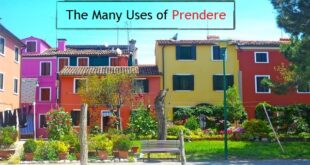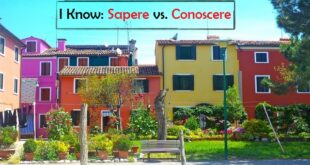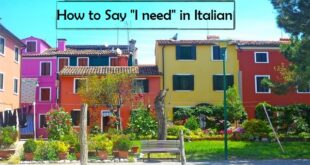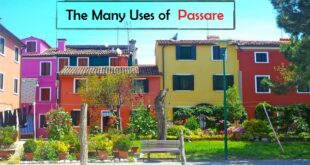The verb stare has an interesting history. Although the direct translation of stare is “to stay,” over the centuries, stare has also taken on the meaning of “to be” with respect to one’s general health. Stare is an –are verb that has an irregular root in the tu and loro forms. In the table below, the regular conjugations of stare are given in green and the irregular forms in brown, in order to make them easier to recognize. Stare is a verb that will truly be used every day, so each conjugation should be committed to memory. Stare – to …
Read More »An Italian Christmas carol
Visiting Italy during Christmastime has been on my bucket list for many years, but for now that dream visit will have to wait. Instead, I would like to share an Italian Christmas carol that makes me feel close to the people in this special country. That carol is “Tu Scendi dalle Stelle.” Although virtually unkown in America, it is said to be the best-loved Christmas carol in Italy. The music and lyrics for “Tu Scendi dalle Stelle” were written in 1732, by Saint Alphonsus Liguori, who was a Neapolitan priest. Liguori originally gave the song the title, “Little song to Child …
Read More »The many uses of prendere
Prendere most commonly means “to take,” but can also be translated as “to bring,” “to pick up,” “to get,” or “to buy/acquire.” The past participle preso can also be used to describe liking someone or something a lot. This use stretches the meaning of prendere a bit, but there is a similar expression in English — being “taken with” someone — that also expresses the same idea. In its reflexive form, prendersi is used to convey how a person can “catch/come down with” an illness. When you are able to visit Italy, use prendere when ordering food in a restaurant …
Read More »TV and movies in Italian
How do I say, “TV show” and “movies” in Italian? The programs we watch on a television set (il televisore) or on a screen (lo schermo) are referred to most commonly in both English and Italian as “TV.” The pronunciation, of course, is different in each language. In Italian, the abbreviation “TV” is pronounced as an Italian would pronounce the letters “t” and “v,” which sounds like “tee-vooh.” Notice from the table below that there is an Italian word for TV programs in general (la televisione), and therefore the Italian abbreviation TV is feminine as well, and takes the feminine …
Read More »Sapere vs. Conoscere
Sapere To be “in the know” about how the Italian language works, we must know how to use the verb sapere and be acquainted with the verb conoscere. Let’s start with sapere. Sapere is an irregular verb that ends in -ere. It means “to know,” as in to know a fact. Since sapere is irregular, the root will be different from the infinitive verb for all forms except the voi form. Interestingly, the root for the noi form differs by only a single letter from the regular root — with the addition of a second letter p. The irregular conjugations are given …
Read More »What I need
Ho bisogno di… When we express our needs, we are also communicating our feelings, and the ability to do this in different ways makes our language skills much more rich. In Italian, there are several verb phrases that can be chosen if one want to express a need: “ho bisogno di,” “mi serve,” and “averne voglia.” Many times, these three verb phrases are interchangeable, but there are subtle differences that determine the choice one makes to use each one. The very popular phrase, “ho bisogno di…” means, “I need…” The verb ho is, of course the first person conjugation of …
Read More »What I want
Volere is an Italian verb that means “to want” or “to need.” Volere ends in -ere, which makes it a second conjugation verb. However, it is also an irregular verb, and the stem will change for all forms except the voi form. As you can imagine, volere is a very important verb to know in order to communicate what your needs are while in Italy, and you will find the io and tu forms are very important to commit to memory. The verb conjugation table below is presented with the visual learner in mind, and this includes color-coding for easy …
Read More »The weather in Italian
For a general assessment of the weather, Italians use the multipurpose verb fare (‘to do’ or ‘to make’) in the third person singular, which you’ll remember is fa. In English, the verb ‘to be’ is used to refer to what the weather actually is outside. Instead, Italians speak of what the weather is doing or making. It’s very important to think in Italian if we want to talk about the weather in Italian. Remember that the reference to “it” in the Italian sentence will be left out, as usual. Below are some examples of how this works, with the correct English …
Read More »The many uses of passare
The Italian verb passare means “to pass,” as in “to pass through,” “pass by,” “pass time,” or “spend time.” This verb is used in many ways in Italian! We use the verb “to pass” or “passed” less often in informal English, often defaulting to more general English verbs like, “get/gone,” “put” or “spend/spent” when we really mean “pass” or “passed.” But in Italian, it is important to be more specific and use the verb passare if you want to sound like a native when describing situations that have come to pass! 1. Use passare when you will “pick up” or …
Read More »The Italian imperfetto
If we want to make general statements in Italian about what has happened in the past, we must be willing to be a little imperfetto! The conjugation of the imperfetto past tense is fairly straightforward. The tricky part is knowing how to use this verb form. The Italian imperfetto refers to the recent past, and is useful when describing events that happened frequently in the past without a specific time frame. The imperfetto in Italian translates into the simple past tense in English and also into “used to” or “was/were…ing.” Let’s learn how to form this tense, which is actually …
Read More » Fra Noi Embrace Your Inner Italian
Fra Noi Embrace Your Inner Italian











